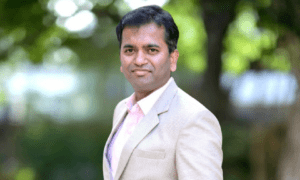A leading software developer from Alfa-Bank shares his principles of establishing a successful career.
According to the recent statistics published by BCG, the number of fintech startups has more than doubled since 2019. As more companies explore the opportunities provided by integrating cutting-edge software solutions into their financial operations, the demand for software developers specializing in this domain grows as well. However, there are certain specifics that differentiate fintech from any other software development sector, which are crucial to consider for anyone who is aiming to build a career in the competitive environment of fintech development. Konstantin Glumov, a software developer who worked for major Russian companies, such as Rostelecom and Alfa-Bank, and the federal-level public structure Social Insurance Fund, highlights the foundations of building a career in the industry. As he has vast experience mentoring beginner developers, his advice is valuable to anyone who hopes to succeed in the industry, regardless of a specific domain.
One of the most important principles for establishing a successful career in the highly competitive software development environment is knowing the specifics of the industry you are working for. Some developers, especially those at the beginning of their career path, tend to overestimate the universal approaches and focus on technological problems when overseeing the specific aspects of company operations. Konstantin Glumov notes that his experience before becoming a software developer significantly helped him change his career and focus. Initially, he studied economics at the Higher School of Economics in Moscow. After acquiring a degree, he started his career as a trader, eventually reaching the position of leading financial analyst and fund manager working with funds of up to 30 million dollars. In parallel, he garnered some experience in coding through developing trading systems. Eventually, he decided to change his career and focus entirely on software development. However, his experience in trading and finance provided him with a unique understanding of the industry, which he could build upon when exploring the new specialization.
Another important principle to consider is the criteria for choosing the first positions to work at. Beginner developers sometimes dream of working at big and renowned companies; however, for the first couple of years, it is important to get varied practical experience. “What can I learn from working there? Will the position allow me to continue developing my skills?” are the crucial questions. Konstantin Glumov mentions that throughout his career, he worked in companies of various scales, which helped him to understand what to focus on and what the best way to advance is. He adds that while it is important to get varied experience at the start, the subsequent stages of building a career as a software developer require a more focused approach, as constant switching to other specializations hinders professional development and can repel a potential employer. Consequently, after working as a full-stack developer for some time, for instance, at one of the biggest Russian IT companies, IBS Group, he decided to focus on a more particular specialization. In the following years, he acquired two Oracle Java certificates confirming both theoretical and practical understanding of the programming language.
Similar to full-stack positions, working in startups and small-scale companies can be beneficial for early career stages, but can become a challenge later on. Konstantin Glumov mentions that he has worked for a US startup for some time, however, he found the environment too disorganized and decided to seek career opportunities in bigger companies, which eventually brought them to working at Alfa-Bank. However, he notes that such experience can provide multiple benefits, especially at the initial phase of the career. Namely, the developers in the startup are often responsible for a broader range of tasks and need to solve them rapidly while switching between multiple instruments and working with the system as a whole, which provides a great, albeit stressful learning experience.
At his current position at Alfa-Bank Konstantin Glumov continues to enhance his skills and apply the expertise he acquired at previous stages of his career. He mentions his recent project of implementing the Family Bank system as an example of the range of skills and knowledge required for a software developer. The goal of the project was to enhance the existing microservice so it could handle thousands of requests per second. First, the team identified a microservice within the same domain and rewritten it from Java to Kotlin, using the advantage of the newer programming language. Then, Konstantin Glumov implemented a cache solution for improved data storage with faster access and reduced load. The microservice was then migrated to Kubernetes, a deployment automation system that improved scalability and fault tolerance, ensuring stable operation even in periods of high traffic. At the final stage, Konstantin Glumov conductor load testing to determine the optimal configuration and ensure all elements of the microservice operate properly. Currently, this microservice has become a critical part of the bank’s infrastructure, as it belongs to the top 400 of most heavily loaded services at Alfa-Mobile. The contribution of Konstantin Glumov established a new direction for the Family Bank, putting a start to developing various products under this umbrella. The processes described here provide a good example of the diverse problems and tasks a developer needs to handle and the knowledge necessary to do so.
After exploring the industry and trying out various technologies, programming languages, and tools, one needs to choose a narrower focus for further professional development. It is worth noting that personal preference is an important factor that is often overlooked. “Beginner developers pay more attention to the technologies that are currently in the spotlight or attempt to chase trends. However, a key to success is choosing the area you will be able to study continuously, developing and honing your skills throughout several years,” comments Konstantin Glumov.
While the initial phase of the software development career can feel challenging and overwhelming, the effort eventually pays off. The testimony to the effectiveness of the approach described by Konstantin Glumov is the fact that the mobile app Alfa-Mobile that he is developing in his current position is currently used by many of the 32 million Alfa-Bank clients, and, moreover, was recently recognized as the best app in the category in Russia. He took part in developing several other products for Alfa Bank as well, improving the experiences for different customer categories. Following the principles outlined above definitely will help one to establish a solid foundation for building a career in software development and achieving success in the field.



































